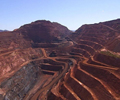

Ongoing unrest this week in South Africa’s eastern province of KwaZulu-Natal has resulted in a number of mining industry operators declaring force majeure in the region that has direct access to both the key Indian and Pacific ocean export routes.
A source at a South African manganese ore miner told S&P Global Platts July 15 that both KwaZulu-Natal ports of Durban and Richards Bay were shut, with the miner as well as other operators using both ports to export minerals.
State-owned rail, port and pipeline enterprise Transnet declared force majeure July 14 at both ports and on NATCOR (Natal Corridor) — one of the country’s key rail lines that links Gauteng, the province containing the country’s largest city, Johannesburg, to Durban, a coastal city in KwaZulu-Natal province, as well as the coast.
Violent protests erupted in South Africa’s KwaZulu-Natal province this past weekend, after the High Court dismissed former South African President Jacob Zuma bid to have his arrest overturned, which meant he remains in jail for 15-month sentence for contempt of court.
Ferromanganese
Ferromanganese producer Assmang — a 50/50 joint venture between African Rainbow Minerals and Assore — declared force majeure on customer contracts in South Africa’s KwaZulu-Natal province due to unrest in the region that resulted in road closures and disruption of port activities, Assmang executive director Andre Joubert told Platts July 14.
Aside from Assmang, Transalloys — South Africa’s largest silicomanganese producer — also declared force majeure on July 14 as trucks were not allowed on the roads, with both companies, as well as other operators, unable to get the gases required to produce, as well as having safety concerns for its staff.
The source at the South African manganese ore miner said Port Elizabeth (PE) — situated on the Eastern Cape, south of the KwaZulu-Natal Province, and Saldanha Bay, a deep landlocked harbour of the Atlantic Ocean found on the Western Cape — were still open with no issues.
“Things [are] not great but [the unrest] is only in specific areas, and so far only alloys have been impacted,” the miner said.
“No impact on manganese ore [deliveries] yet. There will be some manganese ore affected, as some producers move a bit of material thru Durban and Richards Bay ports [in KwaZulu-Natal province] but if PE and Saldanha stay open shouldn’t be much of an impact.”
Exports of several key commodities, including chrome and manganese, may be exposed if the force majeure continues, ED&F Man Capital Markets analyst Edward Meir said in a note.
“But so far, there are adequate stock holdings of both commodities,” Meir said.
Ferrochrome
Market sources told Platts that Glencore’s ferrochrome and cobalt deliveries may potentially be impacted as the company transports via road and export’s both commodities through Durban and Richards Bay.
South African ferrochrome producer Merafe Resources’ CFO Ditabe Chocho told Platts July 15 that the company had been impacted.
“Our business has been impacted particularly by certain supplies to our business (e.g. gas) and some cargo to customer that have been disrupted by the unrest,” Chocho said.
The N3 highway — which connects the provinces of Gauteng and KwaZulu-Natal — on July 13 was entirely closed until further notice.
“Movement of goods has been an issue. Our teams are monitoring the situation closely and will respond appropriately based on circumstances. Where feasible, contingency plans have been put in place to deal with the difficult situation faced,” the CFO said.
Johannesburg-listed Merafe has a 20.5% stake in the Glencore-Merafe Chrome Venture in South Africa — the world’s largest ferrochrome producer — with the rest held by Glencore.
Platinum metals
MKS PAMP GROUP head of metals strategy, Nicky Shiels, said platinum group metals remained well bid, with the rhodium base price up over $1000 day on day on July 13 as unrest continued and with the military brought in.
South Africa accounts for around 80% of global rhodium mined supply.
“Disruption risk is however small as protests are centered in KwaZulu-Natal (Jacob Zuma’s home province) and the cities (not where the mines are located but where refineries are based),” Shiels said.
“Despite that, the N3 — the main artery/highway linking Johannesburg to Durban/ports — is closed and is likely the main priority for the government to reopen. Still, PGMs can act as a proxy for overall ZAR/SA risk, there may be some fear buying, while there’s probably less inventory selling around given the tailwinds in rand based PGMs prices,” the analyst said.
On July 15, Johnson Matthey — the largest secondary PGM refiner in the world — said its London rhodium base price stood at $19,700/oz, up 10% or $1,800/oz from July 12, while refiner Engelhard Materials Services (BASF) of Germany also said its price was at $19,750/oz, also up 10% from July 12.
Source: Platts